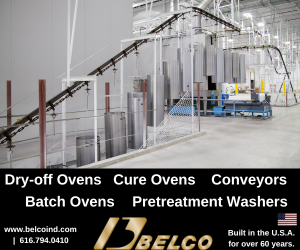Iron Plating Questions and Answers
What types of baths are available for iron plating?
Iron Plating Baths
Q. I recently learned that iron plating is a well-documented plating process but is rarely discussed in the plating word. I need more information on this plating process. What types of baths are available for this type of plating?
A. The iron plating bath is particularly useful for when large build-ups (50 - 100 thousands of an inch) are required. There are a number of different baths available: ferrous chloride, ferrous fluorborate, ferrous sulfamate and ferrous sulfate are common examples. Of these baths, the most common is the ferrous chloride bath. The make up and operation of this bath is as follows:
|
Component |
Concentration & Operating Range |
|
Ferrous chloride dihydrate |
40 - 60 oz/gal |
|
Calcium chloride |
20 - 35 oz/gal |
|
Operating temperature |
185 - 200°F |
|
pH range |
0.5 - 1.5 |
|
Current density (no agitation) |
20 - 80 ASF |
|
Current density (agitation)* |
Up to 200 ASF |
|
Anodes |
High quality iron |
|
Temperature |
190 – 210°F |
|
pH |
0.2 - 1.8 using hydrochloric acid |
*Air agitation must not be used. Air will oxidize the ferrous ions to ferric ions, which will cause rough deposits.
A few other comments:
1. Calcium chloride gives off heat when dissolved in water, so start with room temperature water.
2. After the bath is made up, add degreased steel wool to reduce ferric iron along with activated carbon to remove organic impurities. After this treatment, the solution is filtered into the plating tank.
3. Ductility of the iron deposit is improved at higher temperature, lowest pH and high current density.
4. Safety considerations are important because of the high operating temperaure and very low pH of the solution.
Formulations
Q. Can you offer a formulation for an iron plating bath?
A. There are different formulations for an iron plating bath in the plating literature. Here's one that works well.
| Component | Concentration |
| Ferrous fluoborate | 32 oz./gallon |
| Ammonium chloride | 2 oz./gallon |
| Boric acid | 4 oz./gallon |
| Operating Controls | Range |
| pH | 3-3.4 |
| Temperature | 150-160°F |
| Current density | 2-90 asf |
Related Content
-
Trivalent Chrome Overview
As the finishing industry begins to move away from the use of hexavalent chromium to trivalent chromium, what factors should finishers consider as they make new investments? Mark Schario, chief technology officer for Columbia Chemical offers a helpful overview of this complicated topic.
-
How to Choose Between Sulfate and Chloride-Based Trivalent Chromium
There are several factors to consider when choosing between sulfate and chloride-based baths for trivalent chromium plating. Mark Schario of Columbia Chemical discusses the differences and what platers should keep in mind when evaluating options.
-
Possibilities From Electroplating 3D Printed Plastic Parts
Adding layers of nickel or copper to 3D printed polymer can impart desired properties such as electrical conductivity, EMI shielding, abrasion resistance and improved strength — approaching and even exceeding 3D printed metal, according to RePliForm.















.jpg;maxWidth=300;quality=90)
